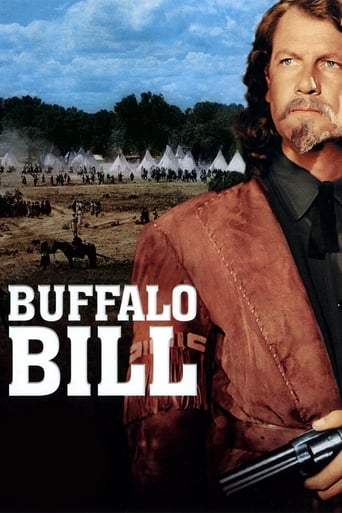HotToastyRag
If you grew up wanting to become a cowboy, following the legendary adventures of Buffalo Bill Cody, you'll definitely want to check out one of the several biopics made in Hollywood and on television. I've only seen the 1944 version and his fictional portrayal in the musical Annie Get Your Gun. Buffalo Bill follows his friendship with Native Americans and shows his courtship and marriage to Louisa, played by Maureen O'Hara.Since this movie was made during the good ol' Hollywood era of racism, the Native American characters who were prominent enough to have dialogues with the leads were played by "ethnics" Anthony Quinn and Linda Darnell, who were subjugated to these types of roles throughout their careers. Maureen O'Hara's character is given a healthy dose of racism, but it's never really addressed, just accepted. As usual, she overacts every line, and contrasted with Joel McCrea's wooden, monotone delivery, both actors come across as incredibly mismatched. He's so incredibly boring, and the rest of the production values are pretty cheap. Unless you absolutely love Joel McCrea, check out another version.
MartinHafer
"Buffalo Bill" is a highly romanticized picture of 'Buffalo' Bill Cody. While IMDb is correct that most of the things in this biopic are actually based on Cody's real-life exploits, most of the relationship between him and his wife was pure hooey. Sadly, there was no great love in Cody's life--or if there was, it wasn't his wife! Most of their life was spent apart by his choice--and there were other women in his life. But, this image of Bill would not have gotten past censors back in 1944, so the studio fictionalized this aspect of his life. The rest, however, is reasonably accurate--something that surprised me as I watched the film. He was a scout for the US Army in the west, he fought in the Indian wars and he did start up an incredibly successful Wild West Show.Another aspect of the film that struck me was its treatment of the American Indians--particularly the Cheyenne. It was odd, as the major roles of the 'Indians' were played by Linda Darnell and Anthony Quinn!!! This insensitivity was pretty much the way American Indians were portrayed in American films through the 1950s. HOWEVER, despite this insensitivity, the film did correctly assert that the Indian wars were forced on these people due to how they were treated by the government. And, in this way, the film was much more balanced than many westerns of the day.Overall, a somewhat inaccurate film that looked nice and featured the excellent acting, as usual, by Joel McCrea. Worth seeing--just not exactly the Gospel! And, the final line of the film might make you throw up--so when that little kid in the audience stands up, PLUG YOUR EARS!!! By the way, the film made one HUGE mistake. General Sherman NEVER said "The only good Indian is a dead Indian". This quote was actually from General Sheridan--though it's not exactly what he said. When he was asked what a good Indian was like, he said very succinctly "...a dead one".
kenjha
This biopic looks back at the life of the legendary Buffalo Bill Cody. Given the subject, the fine cast, a veteran director, and the Technicolor cinematography, the film is a disappointment. The main failing appears to be the script, which is episodic and meandering. After focusing on Bill's frontier escapades, the latter part of the film dwells on his career as a showman, and this is where the film really bogs down. McCrea is believable, if a bit bland, in the title role. O'Hara is given little to do other than look lovely, which she manages quite well. Darnell is also little used as a spirited Indian. Mitchell, Buchanan, and Quinn round out the familiar cast.
GASDOC
I first saw this film in 1944 in Denver, CO., and the last time just recently. It is truly an excellent film. Having lived mostly in Arizona I can certainly understand the plight of the Native American Indian throughout the history of our country.There is a scene in the movie where Buffalo Bill is being honored at a dinner given by a Mr. Vandervere(George Lessey). During the introduction of Buffalo Bill, Mr. Vandervere attributes the quote, "The only good indian is a dead indian" to General William T. Sherman. Sherman may have uttered the quote but it is attributed to General Philip H. Sheridan.Actually, the quote,"The only good indian is a dead indian" is a historical proverb of unknown origin. Edward Ellis in his book, THE HISTORY OF OUR COUNTRY: FROM THE DISCOVERY OF AMERICA TO THE PRESENT TIME(1895) titles a short paragraph, "Sheridan's Bon Mot". Ellis relates an event from an eyewitness account of Captain Charles Nordstrom. It was the writer's good fortune to be present when General Sheridan uttered the Bon Mot in January of 1869 at old Fort Cobb in Indian Territory, now Oklahona, shortly after Custer's fight with Black-Kettle's Band of Cheyennes. Old Toch-a-way(turtle dove), a chief of the Commanches, on being presented to General Sheridan, desired to impress the General in his favor. Striking himself a resounding blow on the breast, he managed to say, "Me, Toch-a-way, me good injun." A quizzical smile lit up the General's face as he set those standing by in a roar by saying, "The only good indians I ever saw were dead."
In later years,General Sheridan denied he ever made the comment.


